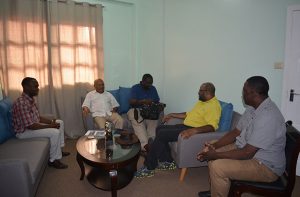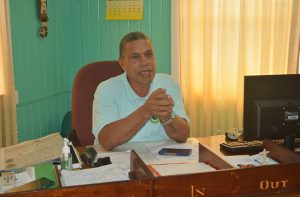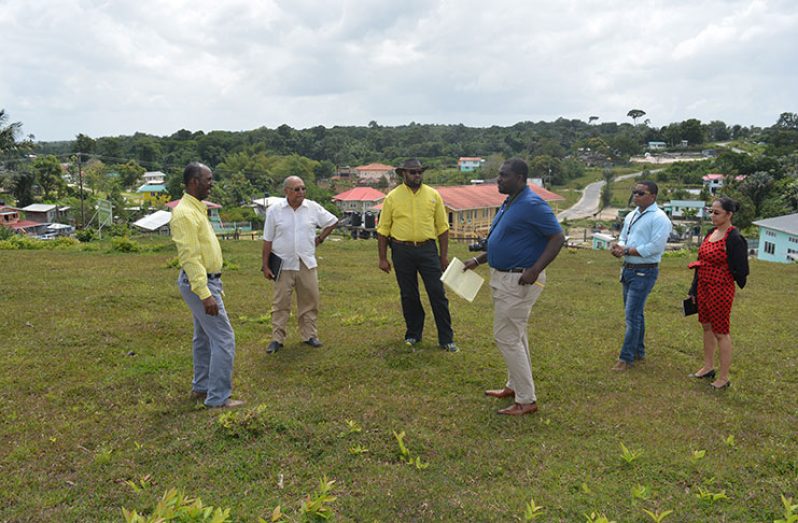FOR the first time in history, residents in far-flung communities such as Kartabo, Westerbeck and Karrau in the Cuyuni-Mazaruni District, will be able to switch on their radios and receive a live feed disseminating not only national and international content, but local information as well. This major development in the field of Information and Communication Technology (ICT) will unfold in May, when the Office of the Prime Minister, through a tripartite partnership, launches the Bartica Radio Station.

The multi-million dollar, state-of-the-art facility is expected to serve the more than 15, 000 residents of Bartica, in addition to the outlying communities not only in the Cuyuni-Mazaruni District, but in Region 10 as well, such as Goshen and Rivers View. Goshen and Rivers View are close to Bartica.
On Thursday, Director of Public Information, Imran Khan, led a team to Bartica to conduct an onsite visit, and to meet with the regional and local authorities there to discuss the project. He was accompanied by Coordinator for the Community Radio Project and Consultant to the Office of the Prime Minister, Dr Rovin Deodat and Assistant Production Manager (Studios) of the National Communications Network (NCN), Devon Roberts.
Just before assessing the two proposed sites, the Bartica Resource Centre and the Youth Choice building on Mongrippa Hill, the team met with the Regional Chairman Gordon Bradford; Regional Executive Officer (REO) Roderick Edinboro; and the Regional Information Officer, Cianna Persaud, at the Regional Democratic Council’s (RDC) office.
In detailing key aspects of the project, the Director of Public Information explained that the community-oriented radio station will be established via a “three-way partnership” among the Office of the Prime Minister, the executing agency, NCN, which is providing technical support and the region. The region is expected to provide the building to accommodate the radio, in addition to human resource (broadcasters) and security.
Khan further explained that once the site is identified and agreed upon, an assessment would be made to determine the necessary renovations and upgrades needed to accommodate the state-of-art-facility, inclusive of a tower.
The technical aspect of the project, he noted, is being spearheaded by Roberts. The physical work or groundwork is expected to commence by March/April.
Dr Deodat, on the other hand, with the help of the local officials, will recruit local persons interested in becoming broadcasters. The potential broadcasters, when identified, will undergo a rigorous training programme, thereby equipping them with the requisite skills and knowledge needed to produce local content.
SUPPORT
In addition to local content, the Director of Public Information noted that the radio station will be supported with content from NCN.
“Outside of the local programmes, the station will carry NCN’s content – the national programmes including the news, some of which you get through 98.1 and VoG, but now you will get a stronger signal and a wider reach, once the radio is set up,” he posited.
Dr Deodat, in briefing the regional chairman, noted that the radio station will significantly benefit the people of Bartica and those within a 25-mile reach.
Using the radio station, the project coordinator explained that the RDC and the Bartica Mayor and Town Council can broadcast public information, while educating the populace of the rich history and culture of the region.

“This is where you showcase the region itself, not merely Bartica, but the wonderful scenes, sites and benefits within this region that contribute to [the] national patrimony,” Dr Deodat said.
He emphasised that the radio station will be a non-partisan and non-conflictual enterprise. He said it should be for development of the region and for the telling of tales by people from this part of the world, and for the reviving of cultural norms that might have been forgotten.
The regional chairman, upon hearing the “good news,” said it is a step in the right direction and will serve the people well. Bradford pointed out that currently, the regional officials would have to either broadcast local information through NCN, or travel to the various communities in order to update themselves on developments within the region.
When established, he said the radio station will play a critical role in keeping residents informed. “It will help us tremendously in terms of disseminating information, particularly to the riverrain communities,” he told the project team.
FUEL DEVELOPMENT
A similar meeting was held at the Town Council with the Mayor Gifford Marshall and Councillors. Marshall, upon being updated on the project, said it will fuel development in the town and the region.
“Communication, we will all agree, is the fuel of any progressive society. Without such, democracy can easily be derailed. It allows for consultation, participation and inclusion of programmes and ideas,” he said.
He said unfortunately, the work of the municipality is significantly hindered due to the lack of effective and constant communication.

“We have long struggled with communicating our vision, programmes and developmental agenda to the people of Bartica.”
However, he noted that with the radio station coming on stream, the Council will be able to effectively communicate with its people.
“The community radio will be a major asset to the people of our town. It reflects Government’s commitment to the transformation of Bartica. Our social, economic, and developmental landscape will be boosted,” the mayor noted.
Additionally, he said the local leaders will be better equipped to educate residents of the Council’s green agenda.
“Moreso, schools, NGOs, Government agencies and the religious community will be in a position to advance their cases through a new form of media.”
In addition to Bartica, community-oriented radio stations will be established in Mahdia, Orealla and Aishalton for 2017 at a cost of $150M.
In 2016, two radio stations were operationalised in Lethem and Mabaruma at a cost of approximately $50M.




.png)









